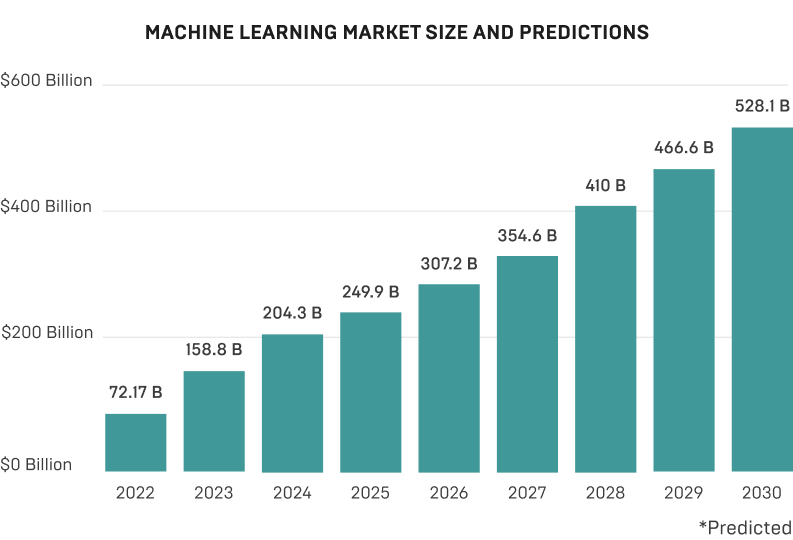Integrating AI & ML in IT startups: Challenges and Best Practices
Challenges of Integrating AI & ML in IT Startups
Integrating AI technologies can be a transformative journey, but it’s not without its challenges. Knowing about them before you start could help you out.
Here are the most common issues and the potential solutions:
Data Quality and Quantity
Insufficient or poor-quality data can result in biased machine learning models and inaccurate predictions. To address this, startups should prioritize collecting, cleaning, and organizing data properly.
- Working with data providers, implementing validation processes, and using data augmentation methods can enhance both the quality and quantity of data. Exploring alternative data sources and tapping into crowd-sourced data can also enrich existing datasets.
Lack of Skilled Talent
The demand for professionals with expertise in these domains far exceeds the available talent pool, making it difficult for machine learning startups to recruit and retain qualified personnel. To address this challenge, new ventures can invest in upskilling existing employees through training programs, workshops, and certifications.
- Outsourcing certain tasks to specialized AI and ML service providers like Reenbit can also help startups access a broader talent pool, supplement in-house capabilities, and accelerate project timelines.
Infrastructure Costs
Building and maintaining the necessary infrastructure for AI initiatives can be costly for startups, especially considering hardware requirements, cloud services, and software licenses.
- To cut costs, startups can use cloud-based platforms with flexible payment plans. Also, they can use open-source tools to save on software expenses. Founders may also want to consider working with incubators, accelerators, and venture capital firms for access to funding and resources for their infrastructure needs.
Regulatory Compliance
Navigating regulatory compliance requirements is another challenge for IT startups integrating AI and ML, particularly in highly regulated industries such as healthcare, finance, and cybersecurity. Data privacy regulations and algorithmic transparency standards impose stringent compliance obligations on startups to, for example, protect service members in the defense sector or maintain patient confidentiality in healthcare settings.
- To address these challenges, startups must keep up with changing regulations, maintain strong data governance, conduct regular audits, and seek legal advice to stay compliant with safe artificial general intelligence requirements.
Ethical Considerations
Biased algorithms can cause discrimination and damage trust; so ML startups need to think about ethics at every stage, from data collection to deployment.
- They can reduce risks by promoting diversity, checking for bias, and setting ethical rules. Engaging with customers, staff, community representatives, and other stakeholders can help build trust and accountability with tech-powered projects.
Integration with Existing Systems
To ensure smooth integration, ML startups must address challenges like legacy systems, incompatible technologies, and organizational silos. They should regularly assess existing infrastructure, and pinpoint integration points, and dependencies.
- Using modular architectures, APIs, and microservices can enhance interoperability and scalability. Collaborating with tech partners and utilizing integration platforms and middleware solutions can expedite integration efforts and speed up time-to-market.
User Acceptance and Trust
Skepticism, resistance to change, and concerns about privacy and security can hinder user adoption and undermine trust in AI and ML systems. Startups must prioritize customer engagement, education, and communication throughout the implementation process.
- Involving end-users in design and development decisions, providing transparent explanations of AI and ML algorithms, and addressing privacy and security concerns proactively can build trust and confidence. Establishing feedback mechanisms and soliciting user input can help AI ML startups continuously improve and refine new technological solutions based on user preferences and needs.
Market Competition
In a fiercely competitive startup landscape, differentiation is crucial for success. Startups must innovate, specialize, and offer unique value propositions to stand out. Leveraging AI and ML can provide a competitive advantage.
- Identifying underserved market segments and collaborating with strategic partners can help startups establish a foothold. Strong brand identities and targeted marketing and sales efforts are essential for startups to differentiate themselves in a crowded marketplace.
Funding and Investment
AI and ML startups face challenges in obtaining funding and investment, particularly in the early stages. Limited access to capital can hinder AI ML startups’s ability to invest in their dream initiatives and scale operations. To secure funding, they must present compelling business cases and investment propositions to attract investors.
- It is recommended to establish connections with venture capital or private equity firms, angel investors, and strategic partners. Participating in startup accelerators, pitch competitions, and crowdfunding campaigns can also contribute to fundraising and visibility. Founders must demonstrate traction, growth potential, and a clear path to profitability to instill confidence in investors and increase the chances of securing funding for their projects.
Integrating AI and ML in IT Startups: Best Practices
Implementing AI and ML in IT startups requires a strategic approach to ensure success.
Here are some best practices to guide startups through the integration process:
-
Start with a clear strategy
First, outline a clear strategy aligned with your business goals. Identify specific problems or opportunities that AI and ML can address, and define measurable objectives to track progress.
-
Build a strong foundation
Successful AI and ML implementations rely on high-quality data. Startups should invest time and resources in data collection, cleaning, and preprocessing to ensure the accuracy and reliability of their datasets.
-
Start small, scale gradually
Rather than tackling large-scale projects from the outset, start with small, manageable initiatives that deliver quick wins. This approach allows startups to gain valuable experience, build confidence, and iterate based on feedback.
-
Collaborate with experts
Partnering with experienced AI and ML professionals or consulting firms can accelerate the integration process and mitigate risks. These experts can guide technology selection, model development, and implementation of best practices.
-
Focus on user experience
AI and ML solutions should be designed with the end-user in mind. Prioritize usability, accessibility, and transparency to ensure that users can easily interact with and trust the technology.
-
Continuously monitor and iterate
AI and ML models are not static; they require ongoing monitoring and refinement to maintain peak performance. Startups should establish mechanisms for tracking key metrics, collecting feedback, and iterating on their solutions over time.
-
Stay informed about regulations and ethics
As digital technologies continue to evolve, so do regulatory and ethical considerations. Stay up-to-date with relevant laws, regulations, and industry standards to ensure compliance and AI safety.
-
Invest in talent development
Invest in training programs, workshops, and mentorship opportunities to upskill existing employees and attract top specialized tech talents.
The integration of AI and ML has brought about significant changes across various sectors, reshaping organizational operations and enhancing customer experiences.
Let’s examine some impactful statistics:
Healthcare
- The global market for AI and ML in medical diagnostics is projected to reach $3.7 billion by 2028, growing at a CAGR of 23.2% from 2023 to 2028. In 2023, the market was anticipated to be valued at $1.3 billion.
Finance
- Fintech companies could achieve cost savings exceeding $1 trillion, with traditional financial institutions potentially reducing expenses by 22% by 2030, as reported by Autonomous.
Marketing and E-commerce
- The retail AI market is forecasted to grow at a CAGR of 35.9%, reaching $15.3 billion by 2025.
Manufacturing
- The global AI in manufacturing market is expected to expand from $3.2 billion in 2023 to $20.8 billion by 2028, with a CAGR of 45.6%.
Agriculture
- The precision agriculture market is estimated to grow at a CAGR of over 13% from 2021 to 2028.
Transportation
- The global intelligent traffic management market is projected to reach $10.94 billion by 2025.
These statistics highlight the tangible impact of AI and ML across industries, with implications for efficiency, safety, and innovation. These effects will likely amplify as time progresses, leading to further advancements in various sectors.
Conclusion
Understanding the difference between AI and human intelligence is essential for preparing for how AI will affect our lives. AI helps big companies with their work and saves them money on hiring. When deploying AI, it’s important to assess your IT setup, find ways AI can be useful, understand your data, provide training, and keep good records. Having a long-term plan is also important for success.
Partner with Reenbit, and together, we will transform your company into a successful startup.

